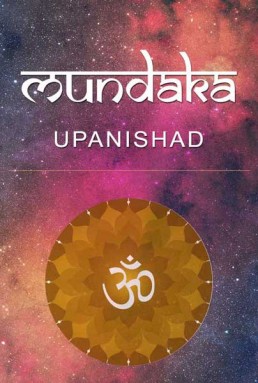मचातुर्मास्यमनाग्रयणमतिथिवर्जितं च ।
अहुतमवैश्वदेवमविधिना हुत-
मासप्तमांस्तस्य लोकान् हिनस्ति ॥ ३॥
macāturmāsyamanāgrayaṇamatithivarjitaṃ ca .
ahutamavaiśvadevamavidhinā huta-
māsaptamāṃstasya lokān hinasti .. 3..
Mundaka Upanishad Introduction
Mundaka Upanishad Invocation
Mundaka 1 – Chapter 1 – Verse 1
Mundaka 1 – Chapter 1 – Verse 2
Mundaka 1 – Chapter 1 – Verse 3
Mundaka 1 – Chapter 1 – Verse 4
Mundaka 1 – Chapter 1 – Verse 5
Mundaka 1 – Chapter 1 – Verse 6
Mundaka 1 – Chapter 1 – Verse 7
Mundaka 1 – Chapter 1 – Verse 8
Mundaka 1 – Chapter 1 – Verse 9
Mundaka 1 – Chapter 2 – Verse 1
Mundaka 1 – Chapter 2 – Verse 2
Mundaka 1 – Chapter 2 – Verse 3
Mundaka 1 – Chapter 2 – Verse 4
Mundaka 1 – Chapter 2 – Verse 5
Mundaka 1 – Chapter 2 – Verse 6
Mundaka 1 – Chapter 2 – Verse 7
Mundaka 1 – Chapter 2 – Verse 8
Mundaka 1 – Chapter 2 – Verse 9
Mundaka 1 – Chapter 2 – Verse 10
Mundaka 1 – Chapter 2 – Verse 11
Mundaka 1 – Chapter 2 – Verse 12
Mundaka 1 – Chapter 2 – Verse 13
Mundaka 2 – Chapter 1 – Verse 1
Mundaka 2 – Chapter 1 – Verse 2
Mundaka 2 – Chapter 1 – Verse 3
Mundaka 2 – Chapter 1 – Verse 4
Mundaka 2 – Chapter 1 – Verse 5
Mundaka 2 – Chapter 1 – Verse 6
Mundaka 2 – Chapter 1 – Verse 7
Mundaka 2 – Chapter 1 – Verse 8
Mundaka 2 – Chapter 1 – Verse 9
Mundaka 2 – Chapter 2 – Verse 10
Mundaka 2 – Chapter 2 – Verse 1
Mundaka 2 – Chapter 2 – Verse 2
Mundaka 2 – Chapter 2 – Verse 3
Mundaka 2 – Chapter 2 – Verse 4
Mundaka 2 – Chapter 2 – Verse 5
Mundaka 2 – Chapter 2 – Verse 6
Mundaka 2 – Chapter 2 – Verse 7
Mundaka 2 – Chapter 2 – Verse 8
Mundaka 2 – Chapter 2 – Verse 9
Mundaka 2 – Chapter 2 – Verse 10
Mundaka 2 – Chapter 2 – Verse 11
Mundaka 3 – Chapter 1 – Verse 1
Mundaka 3 – Chapter 1 – Verse 2
Mundaka 3 – Chapter 1 – Verse 3
Mundaka 3 – Chapter 1 – Verse 4
Mundaka 3 – Chapter 1 – Verse 5
Mundaka 3 – Chapter 1 – Verse 6
Mundaka 3 – Chapter 1 – Verse 7
Mundaka 3 – Chapter 1 – Verse 8
Mundaka 3 – Chapter 1 – Verse 9
Mundaka 3 – Chapter 1 – Verse 10
Mundaka 3 – Chapter 2 – Verse 1
Mundaka 3 – Chapter 2 – Verse 2
Mundaka 3 – Chapter 2 – Verse 3
Mundaka 3 – Chapter 2 – Verse 4
Mundaka 3 – Chapter 2 – Verse 5
Mundaka 3 – Chapter 2 – Verse 6
Mundaka 3 – Chapter 2 – Verse 7
Mundaka 3 – Chapter 2 – Verse 8
Mundaka 3 – Chapter 2 – Verse 9
Mundaka 3 – Chapter 2 – Verse 10
Mundaka 3 – Chapter 2 – Verse 11
Mundaka 3 – Chapter 2 – Verse 12

Sri Shankara’s Commentary (Bhashya) translated by S. Sitarama Sastri
Com.—How is that so? ‘Without Darsa’, without ritual named Darsa; for, one who performs agnihotra should necessarily perform Darsa; though connected with agnihotra (as a part of it) it becomes as it were an attribute of agnihotra. The drift is Agnihotra, without Darsa performed. The expressions “without paurnamasa, etc., as attributes of agnihotra should be similarly noted; for, all are equally the angas (parts) of agnihotra. ‘Without Paurnamasa,’ devoid of the Paurnamasa ritual. ‘Without Chaturmasya,’ devoid of the Chaturmasya ritual. ‘Without agrayana’, devoid of the agrayana ritual which is to he performed in autumn, etc.; similarly ‘without atithi’, devoid of the daily propitiation of guests; ‘ahutam’, oblation not offered well by himself at the time for agnihotra. “Without vaisvadeva”, like “without Darsa”, means devoid of the vaisvadeva ritual. Is ‘irregularly performed,’ oblation though offered, not offered in the proper manner. What such karma, as agnihotra ill-performed or not performed at all, leads to, is stated immediately after. ‘Till the seventh’, inclusive of the seventh. ‘His,’ of the doer. ‘Destroys the seven worlds of the doer’, seems to destroy; because only the trouble taken is the fruit; for, it is only when karma is properly performed, the seven worlds beginning with Bhu and ending with satya are obtained as result, according to the fruition of the karma. These worlds are not obtainable by agnihotra and other karma, performed as just above stated and they are therefore said to be as it were destroyed; but the mere trouble is ever present; or, it may be construed to mean that the three ancestors (the father, the grand-father and the great-grand-father) and the three descendants (the son, the grandson and the great-grandson) connected by the offer of oblations do not confer any benefit on his soul by virtue of the agnihotra and the rest, performed as above stated.
Mundaka Upanishad – Verse 3 – Mundaka-1-2-3-yasyāgnihotra – In Sanskrit with English Transliteration, Meaning and Commentary by Adi Shankaracharya (Sankara Bhashya) – Mundaka-1-2-3
